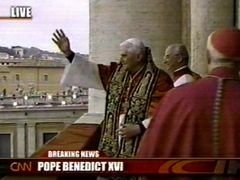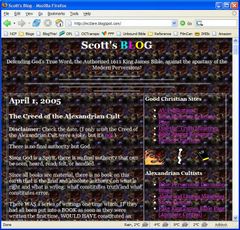I must give credit where credit is due. Karol Wojtyla, aka Pope John Paul II, was a great man.
The late pope has stood against the two greatest threats to human freedom in the last 100 years - Nazism and Communism - and prevailed. His pontificate was marked by his activities as a bridge-builder: reaching out to Jews, to Muslims, even to Protestants, getting people to talk to each other instead of throwing things. He stared down dictators and democrats, leftists and rightists. He was more deserving of the Nobel Peace Prize than half the people who received one during his pontificate. John Paul was a statesman. I do not grudge him that.
John Paul II embodied the moral life of the Gospel: visiting his would-be assassin in prison, acknowledging for the first time that the Crusades were a Bad Idea, that the Roman church could have done more to help the Jews while they were being slaughtered by Hitler's cronies. He forgave and he sought forgiveness. The most travelled pope in history, his public image was one of a shepherd of the church rather than a bureaucrat. He opposed the excesses of capitalism and totalitarianism both. The encyclical Evangelium Vitae brought a wonderful phrase, "culture of life," into the popular culture. The pope was a moral anchor in a world gone morally adrift. Where he would stand with the Bible, I would stand with the pope. I do not grudge him that.
The pope mastered 16 languages. He was an actor, an author, a playwright, and a poet. He was a true intellectual. As an athlete he took up mountaineering, football, and skiing. For four years in Nazi-occupied Poland he was a worker in the quarries. John Paul II was a man for all seasons. I do not grudge him that.
To listen to some of the Vatican officials immediately following the pope's death on Saturday, Jesus, Mary, and the holy angels were practically falling all over each other to fling open the Pearly Gates and usher Karol Wojtyla directly into the presence of the throne of God. It wasn't long before evangelical "leaders" such as Pat Robertson (Pentecostal), Billy Graham (Baptist), James Dobson (Nazarene), and, yes, President Bush (Methodist) were doing the same thing.
This is mushy-headed evangelicalism at its finest: effectively, such "leaders" are claiming that the pope got a "free pass" into heaven because of his good deeds, while they simultaneously forget (or ignore) why it is that Pentecostals, Baptists, Nazarenes, and Methodists are not subject to the pope to begin with.
(To be fair, there is indeed a fair amount of mushy-headedness on the other side as well: people who reflexively declare the pope the Antichrist and consign him to the flames of hell for no better reason than that he was a Catholic pope, and they're agin' it.)
The Roman church has a false view of authority. According to Roman dogma, authority comes from three sources: Scripture, Sacred Tradition, and the Church. However, since the Magisterium of the Roman church (comprising all its bishops) claims for itself the authority to define both the extents and meaning of Scripture and Tradition, in reality Rome arrogates to itself the highest authority.
The Roman church has a false view of salvation. Departing from the simple gospel of divine grace through faith in Christ's completed work on the cross, the Church of Rome has established a complicated sacramental system in which believers continually earn justifying grace through meritorious works and partaking in the sacraments. The church claims to have the authority to dispense from the "Treasury of Merit" the superfluous merit of Christ, Mary, and the saints to those in need of it. Thus the Church of Rome presents a weak Christ who is unable to "save to the uttermost" (Heb. 7:25); his atonement must be supplemented by the righteousness of others. While historically Protestant and Catholic stand in agreement against the classical heresies concerning the person of Christ, surely it is no less dangerous to promote heresies that deny or weaken the work of Christ, is it?
The evangelical rejection of the papacy and the Romanism it represents is no trivial matter. It is based on first principles.
Is the pope in heaven now? While I can't make a definite pronouncement one way or the other, I think it's doubtful. Being the leader of a really big church doesn't merit special grace from God, who is no respecter of persons. I am not a mind reader. I can't get into the head of John Paul II and know what he believed in secret. But as the visible head of the Church of Rome, which preached these untruths, did he repudiate them? No, he defended them, and supported and promoted superstitions that are antithetical to the true Gospel, most notably in his devotion to Mary (it has not escaped the attention of the pundits that his death came on the eve of Divine Mercy Sunday, a feast day he himself instituted in honour of the alleged Marian apparitions of Fatima).
This is essentially nothing different than what people like James White or Al Mohler or La Shawn Barber have been saying in the wake of this weekend's events. Ironically, this position is more consistent with proper Catholic orthodoxy than the more frenzied pronouncements that immediately followed John Paul II's death: since no one can know what thoughts went through his head as his demise approached, no one can be certain that he finally escaped purgatory.
And as a result, they too are being vilified, primarily by Catholics. (White has been specially singled out for vitriol.) Mushy-headedness isn't just an evangelical phenomenon.
 Ingredients: Uncle Ben, rice.
Ingredients: Uncle Ben, rice. Nonetheless, despite his best race so far this year (and his only podium finish in the 2005 season to date) Schumacher couldn't keep Alonso from grabbing a hat trick as he took the checkered flag for the third consecutive Grand Prix on Ferrari's home turf.
Nonetheless, despite his best race so far this year (and his only podium finish in the 2005 season to date) Schumacher couldn't keep Alonso from grabbing a hat trick as he took the checkered flag for the third consecutive Grand Prix on Ferrari's home turf.



![[St. Peter's Square, seen from atop the basilica]](http://photos1.blogger.com/img/56/1290/240/st-peters-basilica.jpg)
![[HRH the Prince of Wales and the Duchess of Cornwall]](http://photos1.blogger.com/img/56/1290/240/royal-wedding-1.jpg)
![[Royal Bentley State Limousine]](http://photos1.blogger.com/img/56/1290/240/royal-wedding-car-2.jpg)
![[Royal Rolls Royce Phantom VI State Limousine]](http://photos1.blogger.com/img/56/1290/240/royal-wedding-car-1.jpg)



